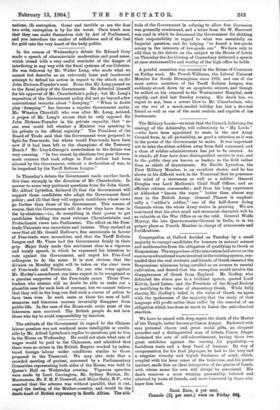In Thursday's debate the Government made another lurch, this time
strongly in the direction of Mr. Chamberlain. In answer to some very pertinent questions from Sir John Gorst, Mr. Alfred Lyttelton declared (1) that the Government will support those candidates who adopt the Government fiscal policy ; and (2) that they will support candidates whose views go further than those of the Government. This means, of course, that the Government will do what they have done in the by-elections,—i.e., do everything in their power to get candidates holding the most extreme Chamberlainite and Protectionist views into Parliament. The effect on the Free- trade Unionists was immediate and intense. They realised at once that all Mr. Gerald Balfour's fine sentiments in favour of Free-trade were moonshine, and that the Tariff Reform League and Mr. Vince had the Government firmly in their grip. Major Seely made this sentiment clear in a vigorous and manly speech, in which he expressed his intention to vote against the Government, and urged his Free-food colleagues to do the same. It is now obvious that the division on Monday night will be taken on the clear issue of Free-trade and Protection. No one who votes against Mr. Morley's amendment can later expect to be recognised as a genuine supporter of the Free-trade cause. Those Free- traders who abstain will no doubt be able to make out a plausible case for such lack of courage, but we cannot believe that they will in the long run find such a course of action to have been wise. In such cases as these the men of half- measures and timorous courses invariably disappear from public life. In the case of the Home-rule crisis none of the lukewarm men survived. The British people do not love those who try to avoid responsibility by inaction.






































 Previous page
Previous page